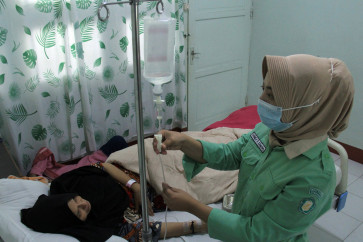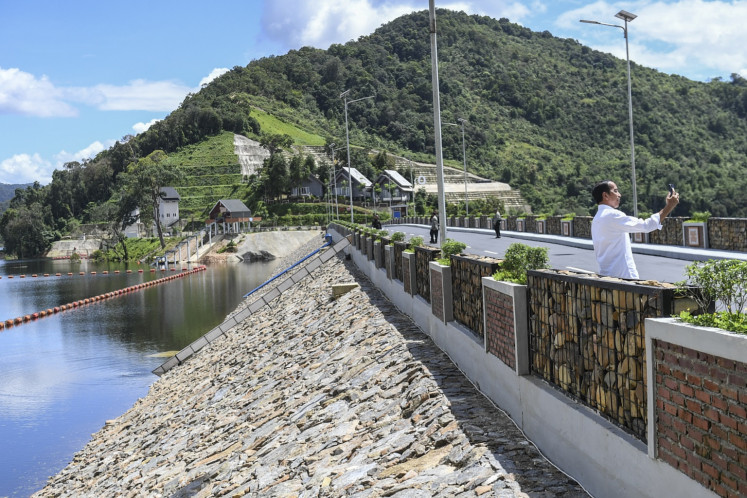A House priority: Revising the oil and gas law
Newly elected members of the House of Representatives for the 2014-2019 period were inaugurated on Oct
Change Size

N
ewly elected members of the House of Representatives for the 2014-2019 period were inaugurated on Oct. 1 and now hope to cultivate trust from the people.
This new legislative period is not only expected to continue the existing legislative program from the previous period. We are faced with elaborate challenges in reference to energy as well as the realization of citizens' general aspirations.
Lawmakers are mandated to make laws, supervise policies and formulate state budgets. It is these three core principles that need to be incorporated with one another.
High expectations need to be handled wisely. There is a lot of potential for the House to improve in this period.
In the previous period (2009 ' 2014), the House's lawmakers were only able to pass 126 laws, far less than the target proclaimed in 2009, of 247 laws.
The total 126 laws only account for 20 percent of the targeted national legislation. Such an achievement is also a decline from the 2004-2009 legislative period where 193 laws were deliberated and passed.
Consequently, there are approximately 27 laws from the previous period of 2009-2014, falling in the priority category, which are still at step one of discussion within commissions.
As Golkar Party chairman Aburizal Bakrie recently stated, the responsibility of new lawmakers includes the revision of more or less 122 laws to make them in line with the Constitution.
These include Law No. 22/2001 on oil and gas and Law No 4/2009 on minerals and coal.
In House Commission VII on energy in the last period, the initiative to revise the Oil and Gas Law led to several academic drafts.
However, until the end of their term on Sept. 30, lawmakers had yet to resolve the oil and gas bill. In this legislative period, the revision of the Oil and Gas Law should be a priority.
As one that was initiated by the House, the Oil and Gas Law amendment is a legislative process that followed public demand and more recently the Constitutional Court's verdict in November 2012 that declared the Upstream Oil and Gas Executive Agency (BP Migas) unconstitutional.
Debates over the revision of the law in Commission VII in the previous legislative period stirred up recurring dynamics concerning several parties.
A number of hearings with stakeholders were held, including with government officials within the industrial sector and academics in the oil and gas sector.
This particular issue needs to be discussed in more depth, drawing emphasis to the responsibility of the state, the determination and management of the working areas, the allocation of revenues for oil producing regions and the need to achieve national energy security.
The key principle in the revision of the Oil and Gas Law lies in the assessment of several chapters that are seen as not incongruent with the Constitution. Thus, there were recurrences where civil society filed a judicial review with the Constitutional Court against certain articles in the law.
The Constitutional Court's verdict in favor of the plaintiffs, who were against the 2001 Oil and Gas Law being expanded to the meaning of state control as stipulated in Article 33 of the Constitution, which mandates the state's responsibilities as follows.
First, policy making; second, administrative functions that authorize the government to issue and revoke permits, licenses and concessions; third, legislation functions to establish laws with the House and government regulations; fourth, state control to oversee and control natural resources for the maximum benefits of the people; and fifth, management control through direct share-holding mechanisms in state-owned enterprises and state corporate bodies as being representative of the state to exploit natural resources for the sake of people's welfare.
Essentially, the governance of the national oil and gas sector is based on chapter 33, paragraph 3 of the 1945 Constitution, where the 'earth, water and natural resources contained in it are controlled by the state and used for the optimal welfare of the people'.
Oil and gas are natural resources, vital for the life of the nation. Therefore, they must be controlled entirely by the state. This particular concept does not simply mean general ownership but also the aspects of management and control directly by the state. It is through this mechanism that the country will maintain its sovereignty and independence over national oil and gas resources.
Consequently, when discussing the independence of national oil and gas, there appears to be problems with regard to the regime of oil and gas governance in Indonesia, which have arisen following the inception of Law No. 22/2001.
Philosophically, the substance of the Oil and Gas Law has been judged as having veered away from the Constitution's mandate, as it fails to ensure the state's possession of oil and gas production.
In the context of state sovereignty and energy self-sufficiency, the exploitation of oil and gas resources has to fall under the state's control and be conducted by state-owned enterprises through their exclusive rights in oil and gas.
Protracted political fragmentation in the House should not be a reason to postpone the amendment of this strategic law, if lawmakers are to live up to people's expectations.
_______________
The writer is deputy chairman of House Commission VII and represents Golkar.









